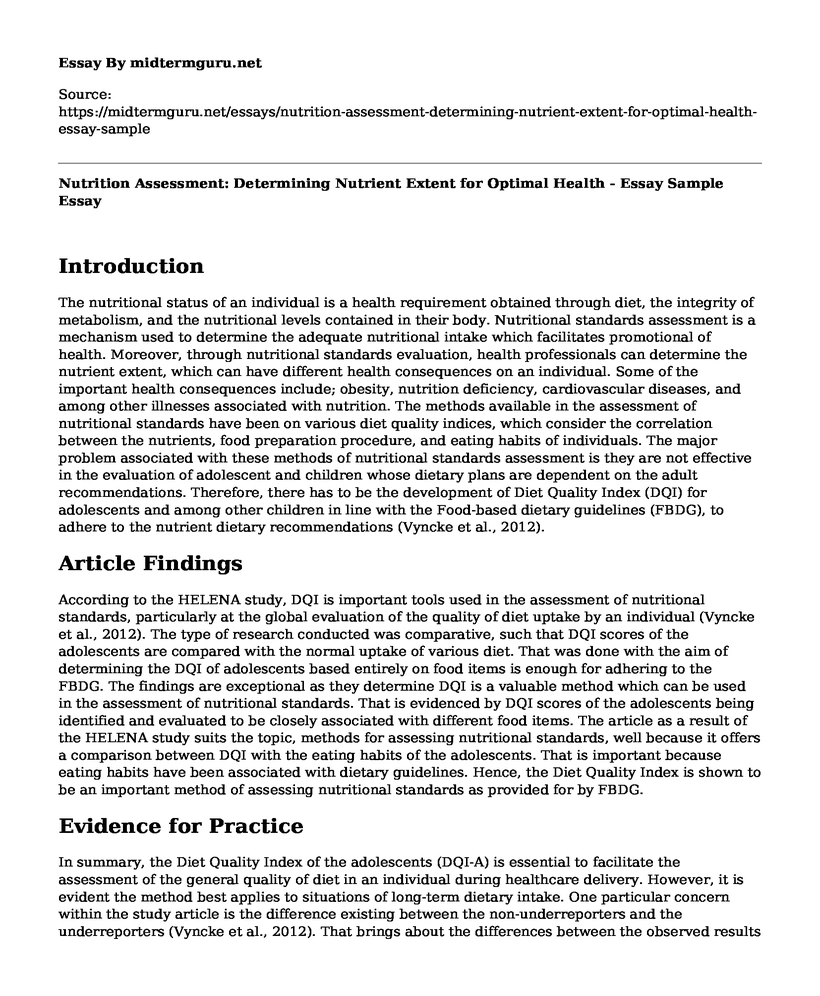Introduction
The nutritional status of an individual is a health requirement obtained through diet, the integrity of metabolism, and the nutritional levels contained in their body. Nutritional standards assessment is a mechanism used to determine the adequate nutritional intake which facilitates promotional of health. Moreover, through nutritional standards evaluation, health professionals can determine the nutrient extent, which can have different health consequences on an individual. Some of the important health consequences include; obesity, nutrition deficiency, cardiovascular diseases, and among other illnesses associated with nutrition. The methods available in the assessment of nutritional standards have been on various diet quality indices, which consider the correlation between the nutrients, food preparation procedure, and eating habits of individuals. The major problem associated with these methods of nutritional standards assessment is they are not effective in the evaluation of adolescent and children whose dietary plans are dependent on the adult recommendations. Therefore, there has to be the development of Diet Quality Index (DQI) for adolescents and among other children in line with the Food-based dietary guidelines (FBDG), to adhere to the nutrient dietary recommendations (Vyncke et al., 2012).
Article Findings
According to the HELENA study, DQI is important tools used in the assessment of nutritional standards, particularly at the global evaluation of the quality of diet uptake by an individual (Vyncke et al., 2012). The type of research conducted was comparative, such that DQI scores of the adolescents are compared with the normal uptake of various diet. That was done with the aim of determining the DQI of adolescents based entirely on food items is enough for adhering to the FBDG. The findings are exceptional as they determine DQI is a valuable method which can be used in the assessment of nutritional standards. That is evidenced by DQI scores of the adolescents being identified and evaluated to be closely associated with different food items. The article as a result of the HELENA study suits the topic, methods for assessing nutritional standards, well because it offers a comparison between DQI with the eating habits of the adolescents. That is important because eating habits have been associated with dietary guidelines. Hence, the Diet Quality Index is shown to be an important method of assessing nutritional standards as provided for by FBDG.
Evidence for Practice
In summary, the Diet Quality Index of the adolescents (DQI-A) is essential to facilitate the assessment of the general quality of diet in an individual during healthcare delivery. However, it is evident the method best applies to situations of long-term dietary intake. One particular concern within the study article is the difference existing between the non-underreporters and the underreporters (Vyncke et al., 2012). That brings about the differences between the observed results and the actual nutritional status. For instance, when BMI is higher in adolescents are expected to have a less healthy nutritional habit, but underreporting results in proper DQI-A scores contrary to reality.
Sharing of Evidence
The evidence should be shared by nurses through occasional training and seminars. Therefore, the study plays a vital role in the nursing practice as it will facilitate easier identification and evaluation of nutritional uptake of the patients, hence their health status.
Conclusion
The development of the Diet Quality Index (DQI) is an essential tool which can be used in the process of assessing nutritional standards of individuals. The nutritional status has been determined to be affected by diverse factors which include; nutrients, food preparation procedure, and eating habits of individuals. Hence, nurses can apply these factors in the calculation of DQI to achieve the promotion of health.
Reference
Vyncke, K., Cruz, E., Fajo-Pascual, M., Cuenca-Garcia, M., De Keyzer, W., & Kersting, M. et al. (2012). VALIDATION OF THE DIET QUALITY INDEX FOR ADOLESCENTS BY COMPARISON WITH BIOMARKERS, NUTRIENT AND FOOD INTAKES: THE HELENA STUDY. British Journal Of Nutrition. doi: 10.1017/S000711451200414X
Cite this page
Nutrition Assessment: Determining Nutrient Extent for Optimal Health - Essay Sample. (2023, Jan 19). Retrieved from https://midtermguru.com/essays/nutrition-assessment-determining-nutrient-extent-for-optimal-health-essay-sample
If you are the original author of this essay and no longer wish to have it published on the midtermguru.com website, please click below to request its removal:
- Essay on Informational Approach in Measuring Organizational Effectiveness
- Essay on Experiences in the MET Calls
- Alzheimer's: Essential Everyday Activities Impacted by Dementia - Essay Sample
- Sugary Drinks Linked to Stroke Risk: Study Findings - Essay Sample
- Buchanan Unites Conservatives on Moral Issues in Bush Speech - Essay Sample
- Understanding Internal vs. External Evidence in Nursing - Research Paper
- Nursing Theory: Dr. Jean Watson's Approach- Essay Sample







